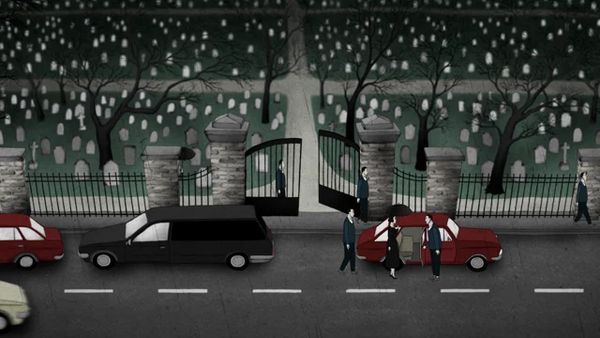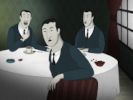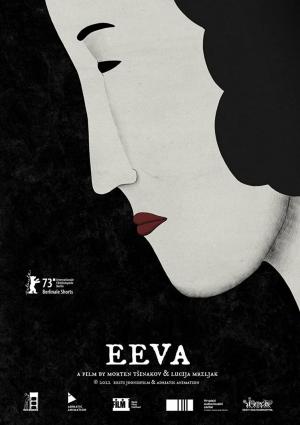Eye For Film >> Movies >> Eeva (2022) Film Review
Eeva
Reviewed by: Jennie Kermode

Though it’s not the only film about grief on the Oscar short film shortlists this year, Lucija Mrzljak and Morten Tsinakov’s Eeva is by far the most immediate and stark, with a darkness to it that the Academy rarely takes on. That it has done to is a tribute to the ideas involved and to the crisp animation with which the story is told. The Best Animated categories have now diversified to the point where it’s difficult to compare films fairly, they’re so differently made, and the excitement of a new technique or the level of polish possible on a big budget can easily distract from the core factors on which a film might be judged, but if we are to value the marriage of the medium with storytelling, Eeva more than pulls its weight.
It begins at a funeral; events imply that it is Eeva’s husband who has died. Almost everything is rendered in black, white, grey, greyish green or red. The sound design is equally harsh. When a woodpecker alights on the coffin and starts hammering away at it, it is too much for the assembled guests, and there is a violent response – the first of several incidents of animal cruelty which some viewers may find hard to watch, even in animated form, but which would seem to reflect Eeva’s inner turmoil and the utter destruction of the moral logic by which she has heretofore lived her life.

She is the only woman at the funeral. The men, almost identical in the dress and simply rendered facial features, evidently don’t know what to do with her, or what to say. At a restaurant after the burial has taken place, she sits alone. The smallest provocation, though absent any indication of malice, drives her into a furious rage. It’s remarkable how intense an expression of violence the filmmakers manage to create using simple techniques. The shock of the other people present helps to emphasise how out of place and out of character Eeva’s behaviour is. They clearly cannot comprehend what is going on inside her head, and perhaps she can’t either.
When Eeva goes home, dream sequences ensue. Their disjointed logic might be a better means for her to explore her pain and sense of dislocation. The framing repeatedly emphasises her solitude. This is a space in which somebody else is supposed to be. Without that presence, she doesn’t know what she is supposed to be. Her final act – whether real or part of a dream, or something in between, is not wholly clear – suggests that she thinks of herself as an accessory to her absent husband, a thing to be tidied away. Her personal survival has lost any meaning to her.
Grief is often treated as something which we should politely handle on our own, out of public view. There’s an expectation – especially where women are concerned – that it will bring about a state of softness or delicacy. Whilst Eeva’s reaction is extreme and very far from something you should try at home, it’s important in its acknowledgement of the rage that some people feel, and as such there will be viewers who find it a relief. Uncomfortable though it is to watch – with a little humour to balance that – it is a useful reckoning with an uncomfortable subject too often ignored.
Reviewed on: 08 Jan 2024
















